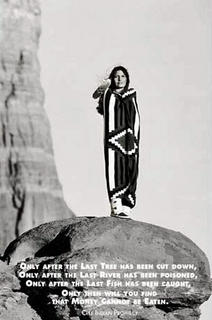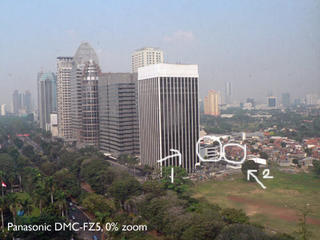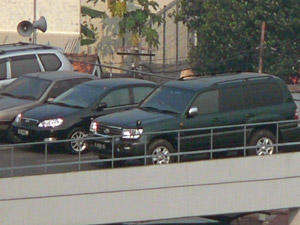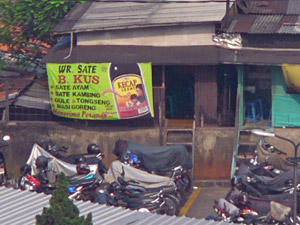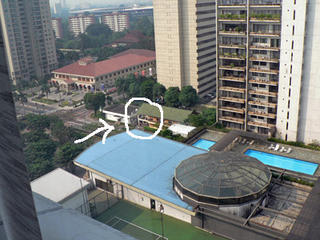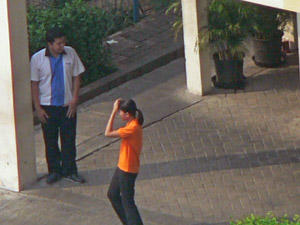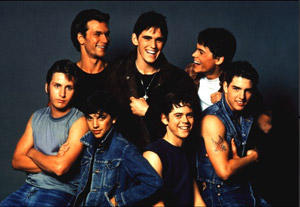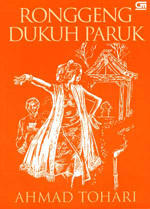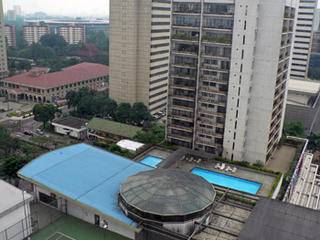5:51 PM
 This is what I saw as I zoomed down to the main highway. The homeward bound craze that will lasts until around 7 PM. I want to go home, but I don't want to get caught in the mud down there. I don't want anymore glare at my wide LCD green. I don't want to read anymore text. I don't want to go down to the stinky basement.
This is what I saw as I zoomed down to the main highway. The homeward bound craze that will lasts until around 7 PM. I want to go home, but I don't want to get caught in the mud down there. I don't want anymore glare at my wide LCD green. I don't want to read anymore text. I don't want to go down to the stinky basement.Ever heard of "sale pisang" (dried banana)? well, "dried banana" is not really the proper translation for it. "hot-aired banana"? Anyways, this "dried banana" aka "sale pisang" (in Indonesian) is a pretty famous snack here. Yeah, us being "Banana Republic".. Making "sale pisang" is a way to avoid farmers from going bananas when they have an abundant amount of ripe bananas.
The recipe for "sale pisang" aka "hot-aired banana" below was found in the web site of "Litbang Hortikultura" aka "Indonesian Center for Horticulture Research and Development". Ripe bananas should be halved or sliced, then laid down under direct sun or in a special dryer. If using a dryer, the sliced bananas must be laid down on a bamboo sheets. The initial temperature is 45-50 degrees Celcius and after a few hours, the heat should be increased to 70 degrees. Drying process should continue until only 15% water remains in the banana. This may take somewhere from 10 to 20 hours. When there is only 15-20% of water remains, basically the banana is cooked and dried and ready to serve.
 There are two versions of this "hot-aired banana" in the snack world. One is the wet version, which is explained here. The other is the fried version. When the banana is cooled, it should be thinly sliced and then dip into a flour batter and plunged into a hot oil. Fry until crisp. No.. it's not bacon strips for breakfast!
There are two versions of this "hot-aired banana" in the snack world. One is the wet version, which is explained here. The other is the fried version. When the banana is cooled, it should be thinly sliced and then dip into a flour batter and plunged into a hot oil. Fry until crisp. No.. it's not bacon strips for breakfast!Despite unhealthy facts from a fellow nutritionist about the fried hot-aired banana due to its high content of carcinogens (because a fried product retains oil and when it is kept for months until its expiration date, it produces carcinogens and other health blah blah..), it is now sold in various taste i.e. cheese and whats nots..
===========================
Image courtesy of: Myself.

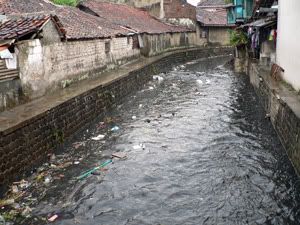 The Paris van Java becomes the kid brother of Jakarta, weirdly inheriting various range of typical "urban problems". The most imminent being "clean water" problem. The head of directorate of geology stated that at present, Bandung has no clean water. Water does exist, but clean is another story. Despite a paradoxical statement from the regional state water company who said that they are in constant search of new spring waters sources sprawling in the suburbs of Bandung, Geology as the mother of ground waterism seems to know better. (don't sue me if i'm wrong, this is a blog, NOT a newspaper column!)
The Paris van Java becomes the kid brother of Jakarta, weirdly inheriting various range of typical "urban problems". The most imminent being "clean water" problem. The head of directorate of geology stated that at present, Bandung has no clean water. Water does exist, but clean is another story. Despite a paradoxical statement from the regional state water company who said that they are in constant search of new spring waters sources sprawling in the suburbs of Bandung, Geology as the mother of ground waterism seems to know better. (don't sue me if i'm wrong, this is a blog, NOT a newspaper column!)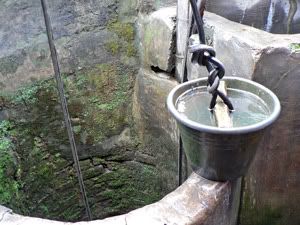 Melting toffee and thick ice blends best describes Cicadas River that runs through Cicadas area that host the bustling Cicadas Market. It's a medium-sized market of consumer goods, but it's still a busy one of wet and dry market. Not far away from the complex of Cicadas Market lies a a densely populated quarter where Cicadas River cuts through. Poor urbanites live in cramped houses with no if not minimum aeration and share wells as well as public toilets by the dozens. In fact, 25-30 families of four (rough counts) share a dug well of 20 meters deep, located less than ten meters away from the slurry toffee-water Cicadas River.
Melting toffee and thick ice blends best describes Cicadas River that runs through Cicadas area that host the bustling Cicadas Market. It's a medium-sized market of consumer goods, but it's still a busy one of wet and dry market. Not far away from the complex of Cicadas Market lies a a densely populated quarter where Cicadas River cuts through. Poor urbanites live in cramped houses with no if not minimum aeration and share wells as well as public toilets by the dozens. In fact, 25-30 families of four (rough counts) share a dug well of 20 meters deep, located less than ten meters away from the slurry toffee-water Cicadas River. Right beside the parking ground of Cicadas Market lies an entrance to this Cicadas Quarter. Half of the width of the entrance is occupied by a small canal. In the evening, livestock traders takes the advantage of the murky Cicadas River to slaughter, disembowel, skin and wash their poultry on a small deck above the canal. Next to the parking ground where city slickers park their shiny vehicles before running for daily errands, the "ready-to-sale chickens" are hanged on a plastic string, waiting for potential buyers. That's the "Chicken's Hell" awright..
Right beside the parking ground of Cicadas Market lies an entrance to this Cicadas Quarter. Half of the width of the entrance is occupied by a small canal. In the evening, livestock traders takes the advantage of the murky Cicadas River to slaughter, disembowel, skin and wash their poultry on a small deck above the canal. Next to the parking ground where city slickers park their shiny vehicles before running for daily errands, the "ready-to-sale chickens" are hanged on a plastic string, waiting for potential buyers. That's the "Chicken's Hell" awright.. 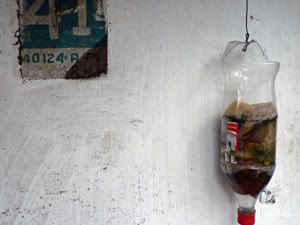 The small canal of Chicken Hell snakes its way through the dense quarter and meets up with the Cicadas River a few meters away in the middle of the neighborhood where the happy impoverished families are bathing, drinking and obeying the call of the nature.
The small canal of Chicken Hell snakes its way through the dense quarter and meets up with the Cicadas River a few meters away in the middle of the neighborhood where the happy impoverished families are bathing, drinking and obeying the call of the nature.